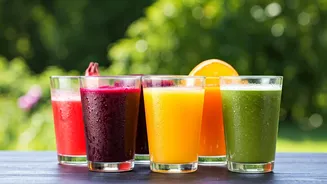Why Heart Health Matters
Understanding the significance of maintaining a healthy heart is crucial for overall well-being. Cardiovascular health affects not only the physical ability
to perform daily activities but also significantly influences longevity and the quality of life. The buildup of arterial plaque is a primary concern, as it can lead to serious conditions like heart attacks and strokes. Therefore, adopting preventive measures is vital, and diet plays a central role. Consuming heart-healthy beverages can be a simple, yet effective strategy to reduce risk. This article introduces five drinks scientifically linked to supporting cardiovascular health. Incorporating these drinks into your daily routine can become a proactive step toward a healthier heart. The choices are not only beneficial but also delicious, offering enjoyable ways to safeguard your heart's vitality.
Green Tea’s Arterial Allies
Green tea is renowned for its wealth of antioxidants, compounds that combat free radicals and protect the body's cells from damage. These antioxidants, especially catechins, have been extensively studied for their ability to improve heart health. Research suggests that regular green tea consumption can reduce LDL cholesterol levels—often referred to as 'bad' cholesterol—which is a major contributor to plaque buildup in arteries. Moreover, green tea can enhance the elasticity of blood vessels, improving blood flow and reducing the risk of cardiovascular events. Including green tea in your diet is a simple yet effective way to support a healthy heart. Brew a cup in the morning, or enjoy it throughout the day for sustained benefits. Opting for a higher-quality green tea can also increase the concentration of beneficial compounds, maximizing the protective effects on your heart.
Berry Smoothies' Power
Berries, such as blueberries, strawberries, and raspberries, are packed with vitamins, minerals, and antioxidants, and are beneficial for cardiovascular health. These vibrant fruits contain anthocyanins, which give berries their rich colors and offer significant protection against heart disease. Anthocyanins reduce inflammation, improve blood vessel function, and prevent oxidative stress. Creating a smoothie with a blend of berries provides a concentrated dose of these heart-healthy compounds. Add a handful of berries to your blender along with some yogurt, a splash of water or milk, and perhaps a touch of honey for natural sweetness. Incorporating berries into your daily diet can support heart health. Berries can also be eaten on their own or added to breakfast cereals. Choosing fresh or frozen berries ensures that you receive a high concentration of antioxidants, maximizing the health benefits.
Tomato Juice's Lycopene Boost
Tomatoes are a fantastic source of lycopene, a potent antioxidant that is particularly beneficial for heart health. Lycopene gives tomatoes their red color and helps to neutralize harmful free radicals in the body. Research indicates that lycopene can reduce the risk of heart disease by lowering LDL cholesterol levels and improving blood vessel function. Moreover, it has anti-inflammatory properties, reducing the risk of plaque formation. Drinking a glass of tomato juice can significantly boost your lycopene intake. Opt for homemade tomato juice to control the sodium levels, or select low-sodium varieties from the store. Lycopene is also better absorbed when tomatoes are cooked, so tomato-based products like sauces and soups are also excellent choices for supporting heart health. Regularly enjoying tomato juice is an easy way to promote cardiovascular wellness.
Beet Juice's Nitric Oxide Magic
Beet juice is gaining popularity as a heart-healthy beverage, primarily because of its high nitrate content. Nitrates are converted in the body to nitric oxide, a molecule that helps relax and dilate blood vessels, thereby improving blood flow and reducing blood pressure. Lowering blood pressure is crucial for preventing plaque buildup and reducing the risk of cardiovascular events. Studies show that regular consumption of beet juice can significantly improve blood vessel function and exercise performance. To incorporate beet juice into your diet, consider juicing fresh beets or purchasing bottled beet juice (ensuring it contains no added sugars). Mixing beet juice with other fruit and vegetable juices can also improve its taste. Beets’ high nitrate content provides a significant benefit for anyone seeking to support their heart health through diet.
Pomegranate Juice’s Protection
Pomegranate juice is rich in antioxidants, notably polyphenols, which are beneficial for heart health. These antioxidants help protect against the oxidation of LDL cholesterol, a crucial step in the formation of arterial plaque. Furthermore, pomegranate juice can improve blood flow and reduce blood pressure, supporting overall cardiovascular function. Regular consumption of pomegranate juice has also been linked to a reduction in arterial plaque. To gain the advantages of this nutritious drink, consider starting your day with a glass of pure pomegranate juice, or mix it with other juices to enhance flavor. Pomegranate seeds can also be eaten on their own or sprinkled on salads. Pomegranate juice can make a flavorful addition to your diet to promote heart wellness, making it a powerful choice for those looking to protect their heart.













